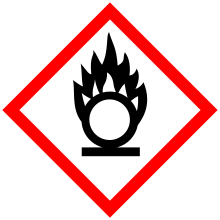Oxidizing agent

An oxidizing agent (also oxidizer or oxidant ) is a substance of other substances can oxidize and thereby even reduced is. Oxidizing agents can accept electrons while reducing agents release them. That is why oxidizing agents are also known as electron acceptors .
Change of term
In the narrower, historical sense, an oxidizing agent - in addition to oxygen itself - is first of all a substance that can give off oxygen (but it is better to speak of oxygen carriers). In view of the fact that oxygen itself - just like fluorine , chlorine , etc. - absorbs the electrons of the oxidized (fuel) substance during each combustion process , the current definition of electron acceptor was created.
Examples
Oxygen difluoride and fluorine itself are the most powerful oxidizing agents after krypton difluoride . Further examples are hydrogen peroxide H 2 O 2 and its adducts such as sodium percarbonate , oxygen-containing anions ( oxo anions ) of transition metals in high oxidation states such as permanganate MnO 4 - (see potassium permanganate ) or dichromate Cr 2 O 7 2− and chromium (VI) oxide ( Jones -Oxidation ), metal ions such as Ce 4+ , noble metal ions such as those of silver and copper, anions of halogenated oxygen acids such as bromate BrO 3 - and hypochlorite ClO - , or elements such as oxygen (Latin: oxygenium , hence the term "oxidizing agent"), sulfur and the halogens fluorine, chlorine , bromine and iodine .
Oxidation and reduction
Oxidizing agents react with reducing agents in a redox reaction . B. also the analytical method of redox titration . Oxidizing agents oxidize substances and are themselves reduced in the process.
Oxidizing agents as bleaching and disinfecting agents
As bleaching agents in papermaking and in the manufacture and cleaning of textiles as well as disinfectants , the following oxidizing agents are or were of everyday importance:
- Ozone (O 3 ) and the peroxides hydrogen peroxide (H 2 O 2 ) and peroxyacetic acid (peracetic acid, abbreviated PES, CH 3 CO 3 H) - bleaching agents based on oxygen;
- the hypochlorites , sodium hypochlorite (NaOCl, chlorine bleach / chlorine bleach) / Javel water / Eau de Javel / potassium hypochlorite (KOCl) and chlorine (gas, aqueous solution) - bleaching agents based on chlorine;
- in detergents and cleaning agents also the peroxides perborate and percarbonate ;
- also iodine for disinfecting .
Chlorine-based methods are more efficient and cheaper than oxygen-based methods, but on the other hand they are more environmentally questionable and tend to have an unpleasant smell. However, ozone has a similar effect on people as chlorine - irritating to toxic.
Substance list
→ Category: Oxidising substance
literature
- Otfried Müller: Chemistry simple and understandable. Norderstedt, ISBN 3-8334-2178-9 .
- Henrikus Steen (ed.): Manual of explosion protection. Verlag Wiley-VCH, Weinheim 2000, ISBN 978-3-527-29848-8 .
- Wolfgang Weißbach, Volkher Biese, Uwe Bleyer, Manfred Bosse, Paul Scheipers: Chemistry. Basics and applications, Vieweg Verlag, Wiesbaden 1981, ISBN 978-3-528-04069-7 .
Web links
- Hazards from strong oxidizing agents (PDF, accessed December 30, 2016)
- Hydrogen peroxide as an oxidizing agent (PDF, accessed December 30, 2016)
- Oxidation and Reduction (PDF, accessed December 30, 2016)
- In-situ application of chemical oxidizing agents and oxidation processes (PDF, accessed December 30, 2016)
